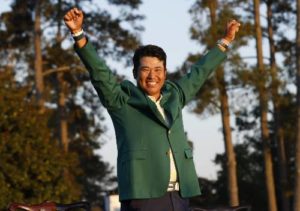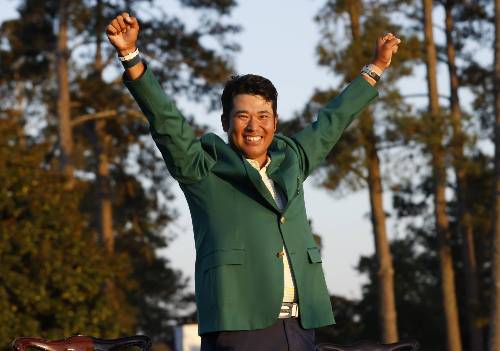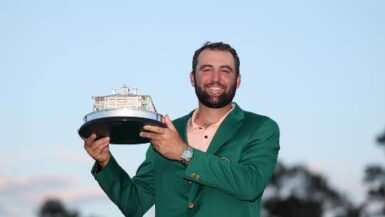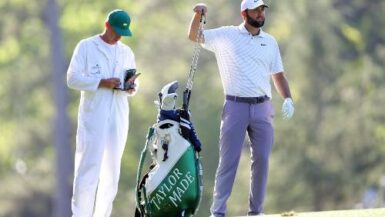
It was either going to be the Green Jacket or a straightjacket; there was no middle road for Hideki Matsuyama.
Japan’s newly-minted greatest golfer ever won the 2021 Masters, but only after nearly squandering a 6-shot lead and hanging on narrowly after late charges by Xander Schauffle and Will Zalatoris fizzled.
Matsuyama’s 10-under score edged major championship rookie Zalatoris by one, but by all rights Hideki’s back nine 39 should never have gotten him into Butler Cabin. Matsuyama turned in 34 to post 13-under through 63 holes, and the back nine looked to be a coronation waiting to happen. He was six shots clear of Zalatoris and seven ahead of Schauffle. Hideki was set up for as easy a stroll as Dustin Johnson had last year. So much so that CBS broadcaster Jim Nantz said Matsuyama was “in full sprint to Butler Cabin.”
But the back nine at Augusta is not a sprint, it’s a half marathon. And in trying to run, Matsuyama nearly tripped. Bogey at 12 and a birdie by Schauffle, playing with Matsuyama, cut the lead to five. They both birdied 13, but Schauffle birdied 14 as well. It seemed an afterthought at the time; the lead was still four with just four holes left. And with both players safely in the fairway at the par-5 15th, there absolutely, positively one mantra to remember: driest ball wins.
In exactly the same position last year, Dustin Johnson, one of golf’s apex predators when it comes to gargantuan length through the bag, laid up his shot at 15. It was almost comical how he bunted a little pipsqueak of a wedge shot to the perfect position for a lofted club to a dangerous pin and a green with water both in front and behind. He made birdie and won by five shots.
Now it’s a golden rule of golf course architecture that you can let a player hit a green in one shot less than regulation, but you certainly do not have to help them do it. Greens on par-5s are usually designed to accept wedges, not low screamers, runners, or bullets. True to form, the Sunday pin on 15 was set precariously between two water hazards – one in front and one in back – severely testing distance control. Is it such a good idea to try hitting a fairway wood, or even a 4-iron as Hideki did – to a sucker pin with the Green Jacket in the balance and a four shot lead? Crazier things have been tried but not often by sane people, (unless, of course, it’s Phil Mickelson).
Sure enough, Matsuyama launched an ICBM into the Georgia sky that zoomed over Rae’s Creek, over the pin, and…wait for it…over the green on the fly. It careened off the downslope behind the green and splashed into the pond fronting the 16 tee.
How about that? Dustin Johnson was smarter than Hideki Matsuyama in the clutch.
I’m surprised he went for the green,” Schauffle confided. “I think, if he had to do it over again, for how good his wedges have been this week, I think he would have laid it back….he definitely made it interesting for me personally at that time.”
Finally sensing the opening he’d waited for all day, Schauffle bunkered his approach, but converted the up and down for a fourth consecutive birdie. Who’s sprinting to Butler Cabin now?
You could read Schauffle’s thoughts as he strode to the tee.
Your adrenaline is up. You’ve got all the momentum. He’s finally showing a sign of cracking. It’s Sunday pin at 16 at Augusta, and that means gettable. Now go for the dagger!
“I hit a perfect 8 iron. It was 184 yards. I can hit my 8 iron 180 yards out here,” Schauffle explained. “I turned it right to left. The wind was into left to right. It got smoked and eaten up. You could kind of see it. The ball hovered there.”
Hovered…floated…fluttered…we all saw it, all through its flight, and we knew it was doomed. It landed weakly in the face of the bank before trundling into the water. It led to a triple bogey six. Balloon, meet pin. Womp womp wooooooooomp…
What did we just say a few paragraphs ago, Xander? Driest ball wins…
That should have been the end, but Matsuyama was on auto-pilot, playing not to lose. He also bogeyed 16, his usually dazzling short game suddenly turning indifferent. Another sloppy bogey at 18 – a flared iron shot into a bunker and a missed short putt – and that meant the margin of victory was one over Zalatoris and three over Schauffle and Spieth, whose 69 vaulted him into a tie for third. Spain’s Jon Rahm and Australia’s Marc Leishman tied for fifth at 6-under.
Matsuyama bogeyed three of his last four holes to become the first Masters champion with a final round over par since Trevor Immelman shot 75 in 2008. His 10-under score was half Dustin’s winning total from last year. It shows you exactly how much weather and conditioning affect scoring.
Still, it was a remarkable resurgence to see the 25-year old PGA Tour star suddenly catch the same fire he had for several years before falling off the radar screen. He was not on many people’s short lists to win pre-tournament. And his last PGA Tour victory was a long four years ago at Firestone.
“It’s been a struggle recently. This year, no Top 10s, haven’t even contended. So I came to Augusta with little or no expectations. But as the week progressed, as I practiced, especially on Wednesday, I felt something again. I found something in my swing,” Matsuyama said thoughtfully. “:And when that happens, the confidence returns. And so I started the tournament with a lot of confidence.”
Confidence: that’s a word we all need right now, and it’s been in too short a supply of late. Perhaps never before has the country experienced a reawakening and re-emergence as it has this spring. With Coronavirus finally seeming to fade and America reopening, the Masters once again admitted patrons and journalists, albeit precious few, and the tournament felt like the sunrise it is, not just for golf season, but for our collective conscience recovering from last year’s pandemic.
Nevertheless, it’s critical to keep perspective at a time like this. Any sports fan (and writer) worth their salt knows that – even though it’s the Masters at our beloved Augusta National – we are discussing true minutiae, the pleasures of leisure time and escapes from reality of our lives. Dustin Johnson’s title defense was not a metaphor for life, even though he did contract the disease and recover from it before winning last year. Hideki’s victory is great for Japanese golf, but it doesn’t offer security to his country of his people in an increasingly unstable geo-political environment in the Pacific Rim. And our beloved Augusta will fade once again come Monday morning.
Still, we also look to the Masters – and indeed to all competitive sport – for inspiration. Oddly enough, Matsuyama admitted that his sports heroes growing up were baseball players, pitchers like Yu Darvish of the L.A. Dodgers. But now an entire generation of Japanese sports fans have his name to add to their Pantheon of great sports heroes: the first male Japanese golfer to win a major championship. Now thousands of kids from Sapporo to Nagasaki will be arguing with each other on the first tee:
I wanna be Hideki!
You were Hideki last time! It’s my turn to be Hideki!
And so the Masters leaves everyone worldwide with one last miracle: the Masters leaves us with hope. And that’s enough to get us started as we continue to fight back against this plague that blighted the world for too long.





